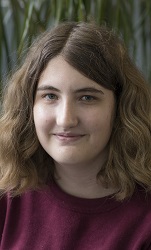

Prize for original contributions of early-career scientists
The Malcolm Walker Award aims to recognise and encourage new environmental researchers from a wide range of disciplines.
The L F Richardson Prize is awarded annually for a meritorious paper which was published in a Society journal during the preceding four years and was contributed by a member of the Society who is in their early career in meteorology.
2021 Awards & Prizes
- Distinguished work and careers
- Outstanding contributions published in the Society’s journals
- Original research, innovation and significant contribution to meteorology and its application
- Original contributions of early-career scientists
- Outstanding contribution in public outreach and communication
- Outstanding contribution or service to the Society or the Society’s journal Weather
- Journal Editor's Awards
Malcolm Walker Award
Chloe Brimicombe

Chloe Brimicombe is an outstanding researcher undertaking timely and world class scientific research on heatwave health hazard forecasting at the University of Reading and the European Centre for Medium-range Weather Forecasts (ECMWF). Her interdisciplinary PhD research on “Silent heat impacts” uses climate and earth system modelling techniques to inform policy, development and disaster risk reduction for heatwaves.
Chloe has published on many different aspects of heatwaves with huge originality and flair. Her work has looked at the development of the distribution of human heat stress across the world, and has found that heat stress has grown larger in extent, more so during a heatwave. She has also identified the worrying underreporting of heatwave related impacts in emergency events databases and climate reports. Her work provides a strong historical context in understanding both the changing nature of heatwaves across the globe over centuries and also the deficiencies in historical choices of heat health policies and protocols for reporting heatwave impacts. Chloe has also developed the Thermofeel Heat stress software at ECMWF now being implemented in their meteorological forecasting systems, and has also published on the unacceptable deficiencies in UK heatwave policy.
However, what has been equally impressive, and what makes Chloe especially stand out from her peers, is her ability to communicate her research to the public and to policymakers and decisionmakers and other scholars across disciplinary boundaries. She is extremely passionate and knowledgeable about the climate emergency and this shines through in the huge number of public facing talks, news media appearances and articles, workshops, outreach events and science communication blogs that she has undertaken since beginning her PhD. She has written articles about heatwaves for the Conversation which have been republished worldwide and has written an invited guest post in Carbon Brief on the extreme weather in 2021.
Using innovative imagery, passionate storytelling and her scientific expertise, Chloe has been able to bring to light some of the huge injustices and difficulties to do with heatwave mortality and morbidity around the world. Her four-part photo entry ‘Climate Change is Happening’ won a Royal Geographical Society science communication award. She has presented her research to world leading meteorologists, has been quoted in national news media including appearing as expert on BBC news, works coproducing research with the Red Cross in Africa, develops and runs art and poetry outreach events, gives seminars to school children and always provides a passionate and evidence based approach to communicating both the reality of the climate emergency and what we can do about it.
|
|---|
L F Richardson Prize
Dr Beth Woodhams
Dr Beth Woodhams is an outstanding young scientist, who has already made an impressive contribution to our understanding of the atmospheric processes controlling convective storms and their predictability in weather forecast models. Her 2021 paper, “Aircraft observations and sub-km modelling of the lake–land breeze circulation over Lake Victoria” provides novel in-situ observations of the lake-land breeze circulation over Lake Victoria in East Africa and important new insights into the drivers of severe convective storms in the region that are responsible for the deaths of thousands of fishermen each year.
Detailed observations of the lake-land breeze system, which plays a significant role in producing the convergence required to trigger deep convection over the lake, were completely lacking. During her PhD, it was Beth herself that proposed the idea of piggy-backing on a separate project to enable a number of research aircraft (FAAM BAe-146) flights within the lake–land breeze circulation over Lake Victoria. Beth’s prior modelling work was invaluable in planning the routes and altitudes of the flights and Beth played a lead role in ensuring an optimal strategy for the flight plans. The plan was so well executed that the flights provided measurements of both the daytime lake–land breeze and the nocturnal reverse circulation in unprecedented detail.
In her 2021 paper, Beth analysed the aircraft observations alongside high-resolution model simulations to characterise key features of the lake–land breeze circulation, such as wind convergence at the lake breeze front and an elevated moisture bulge with wave-like propagation characteristics. Her paper provides evidence of the key processes numerical weather prediction models must represent to provide more skilful storm forecasts and points to a number of focus areas for future model development.
To gain so much insight from only two research flights is an absolutely fantastic achievement for any scientist, but particularly for someone so early in their career with no prior experience of research flights. The fact that Beth actually identified the whole opportunity only adds to the achievement.
|
|---|

